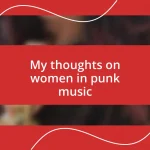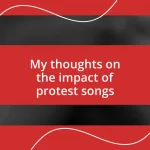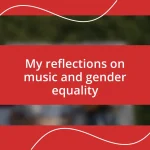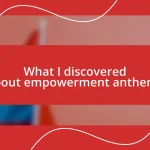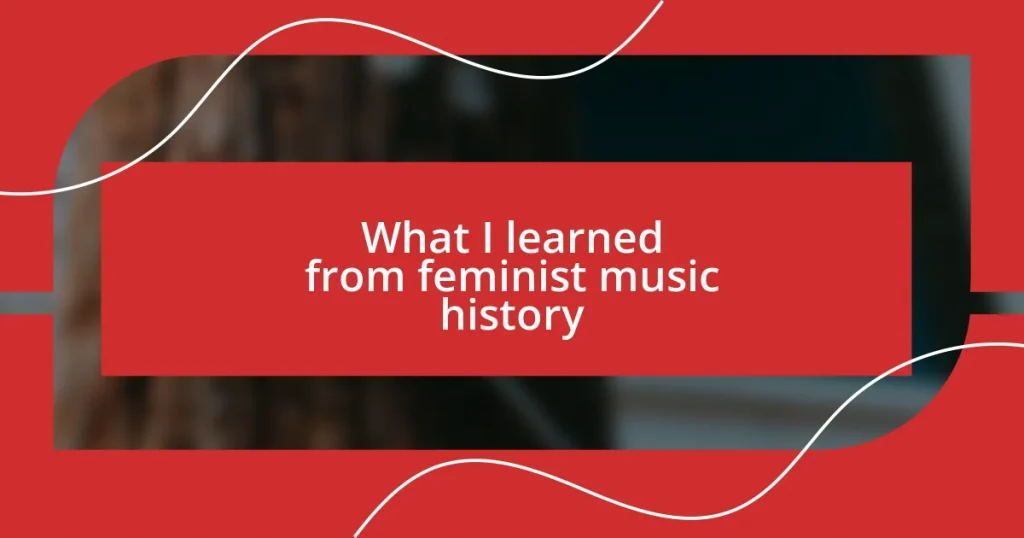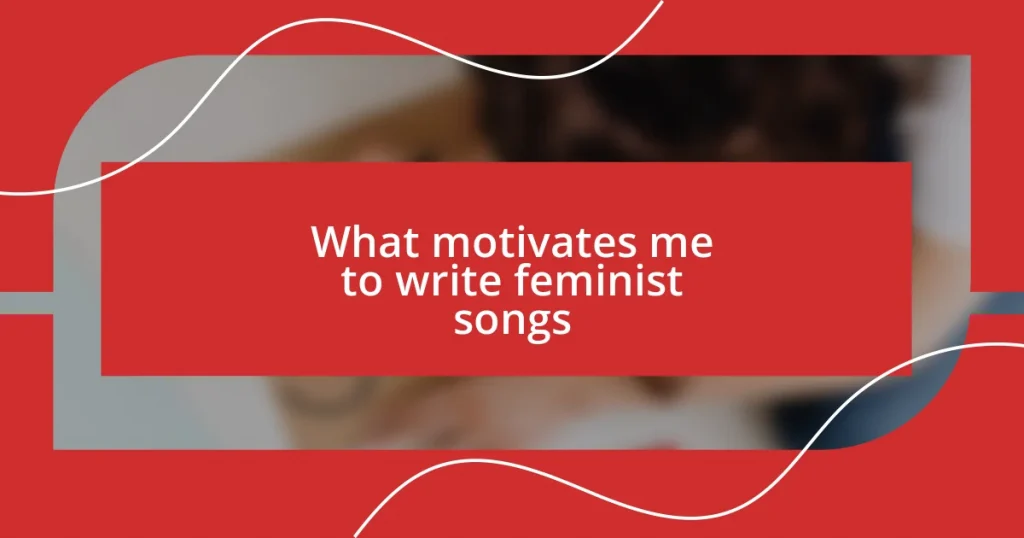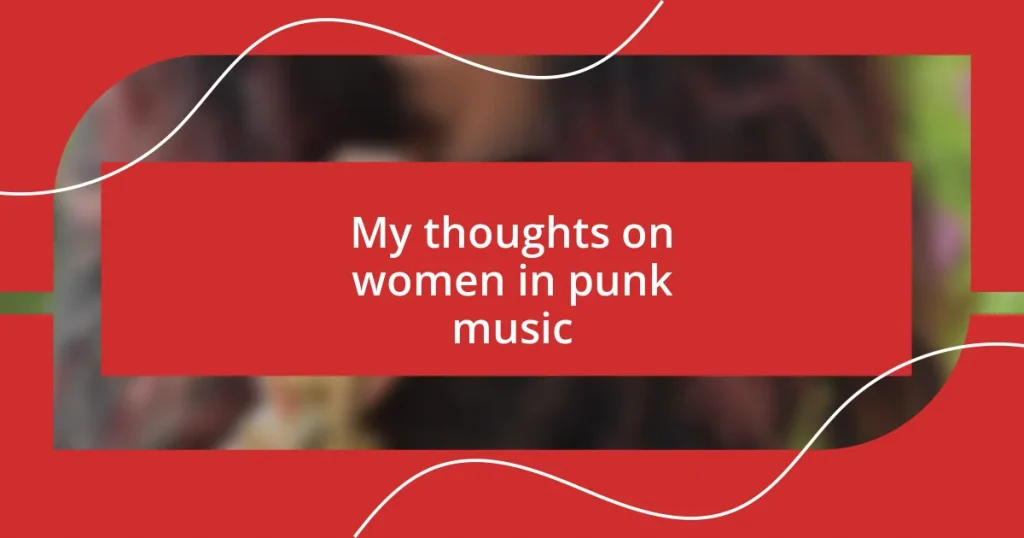Key takeaways:
- Feminist music history highlights the power of artists to challenge gender norms and empower women through their lyrics, contributing to social movements and cultural change.
- Key figures such as Joni Mitchell, Ani DiFranco, and Lizzo embody the evolution of feminist expression in music, inspiring listeners to embrace their individuality and confront societal expectations.
- Modern feminist music emphasizes authenticity, collaboration, and storytelling, encouraging future musicians to share their true selves and draw connections with their audience for impactful creative expression.
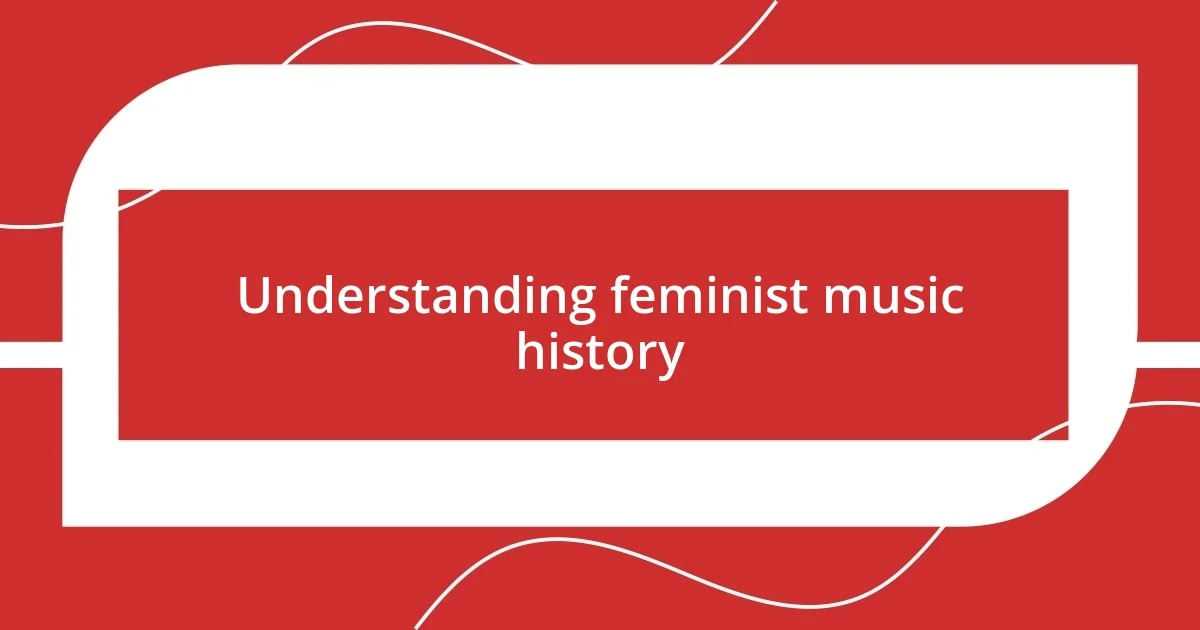
Understanding feminist music history
Feminist music history is a dynamic tapestry woven from various artistic expressions, aiming to challenge gender norms and elevate women’s voices. I often reflect on how iconic songs like “Respect” by Aretha Franklin not only demand recognition but also mirror broader societal changes regarding women’s rights. Isn’t it fascinating how a simple melody can encapsulate a movement?
As I explore this history, I’m struck by the power of lyrics as a form of resistance. I remember hearing the raw energy of “Rebel Girl” by Bikini Kill for the first time; it felt like a call to arms for young women, imbued with a fierce sense of empowerment. How many times have we turned to music for solace, guidance, or motivation? This connection illustrates how artists have historically used their platforms to shed light on issues like sexism, body image, and sexual empowerment.
Delving deeper into the past, I can’t help but consider the struggles female musicians faced to claim their space in an often male-dominated industry. The stories of pioneers like Billie Holiday and Joan Baez resonate with me; their battles were not merely personal but were emblematic of a larger fight for equality. Their music becomes a rallying point, doesn’t it? When we listen, we become part of their legacy, which continues to inspire new generations of artists and advocates for change.
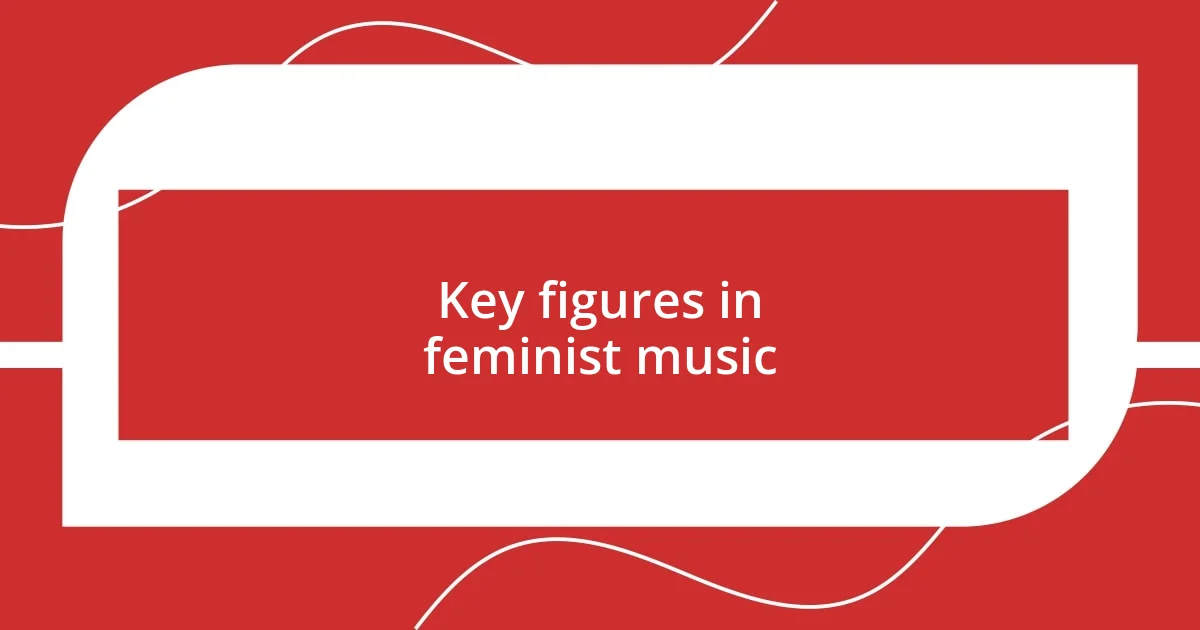
Key figures in feminist music
As I dive into feminist music history, certain figures stand out for their groundbreaking contributions. Artists like Judy Chicago and her songs captured the complexities of women’s experiences, sparking conversations that still resonate today. I remember listening to “The Woman’s Song” and feeling a profound connection to its themes of identity and resilience; it was as if she was speaking directly to my soul.
Here’s a closer look at some of the key figures who shaped feminist music:
- Joni Mitchell: With her introspective lyrics, she often explored themes of love, loss, and female empowerment, captivating listeners worldwide.
- Ani DiFranco: Known for her fierce independence, Ani’s music confronts gender and social issues head-on, inspiring many with her unapologetic spirit.
- Björk: Blending technology and emotion, her avant-garde approach challenges traditional norms and expresses the intricacies of femininity.
- Sister Rosetta Tharpe: A true pioneer of gospel music, she blended genres and paved the way for countless female musicians who followed.
- Pat Benatar: Her powerful anthems of strength, like “Hit Me With Your Best Shot,” continue to resonate, embodying the fight against societal expectations for women.
Reflecting on these artists, I often find myself inspired and challenged. Their courage to confront societal norms through music has not only shaped my understanding of feminism but has empowered me to embrace my voice more fully. Each note they crafted is a reminder that change often starts with bold expression.
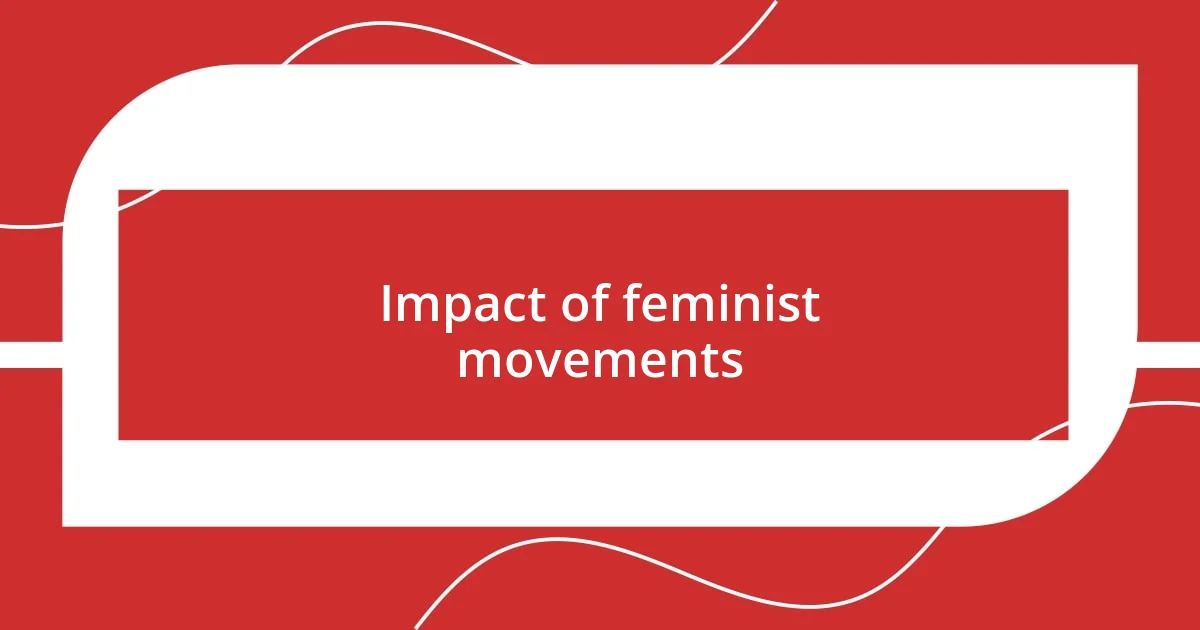
Impact of feminist movements
The feminist movements of past decades have profoundly influenced the music industry and broader cultural landscape. I can’t help but think about how each wave of feminism brought new perspectives and genres to the forefront. The empowering songs from these movements, like “I Will Survive” by Gloria Gaynor, echo resilience and determination, inspiring countless women to embrace their strength. Have you ever felt a rush of confidence from a song? That’s exactly the kind of empowerment these movements cultivated.
As feminist movements expanded, so did the variety of musical expressions in genres like punk, folk, and hip-hop. Artists seized opportunities to challenge societal norms through their lyrics. I remember attending a concert where artists spoke candidly about their experiences with sexism in the industry. It was nearly electric; their stories resonated with the audience’s own struggles, creating a community of support and understanding. The raw energy revealed how interconnected music, activism, and feminism truly are.
I also observe how feminist movements empowered women to write and produce their own music. The rise of independent artists facilitated a space where women’s voices could shine without corporate constraints. This shift is significant; it allows for authenticity in storytelling, which reflects the real experiences of women. When I listen to artists like Lizzo, I feel an undeniable sense of joy and liberation. It’s like each note celebrates individuality and defiance against societal standards. Isn’t that a beautiful testament to the impact of these movements?
| Feminist Movement | Impact on Music |
|---|---|
| First Wave (1900s) | Focused on suffrage and equality, leading to songs advocating women’s rights |
| Second Wave (1960s – 1980s) | Emergence of feminist rock and punk, with themes of empowerment |
| Third Wave (1990s – 2000s) | Promotion of diversity in women’s experiences and identities within music genres |
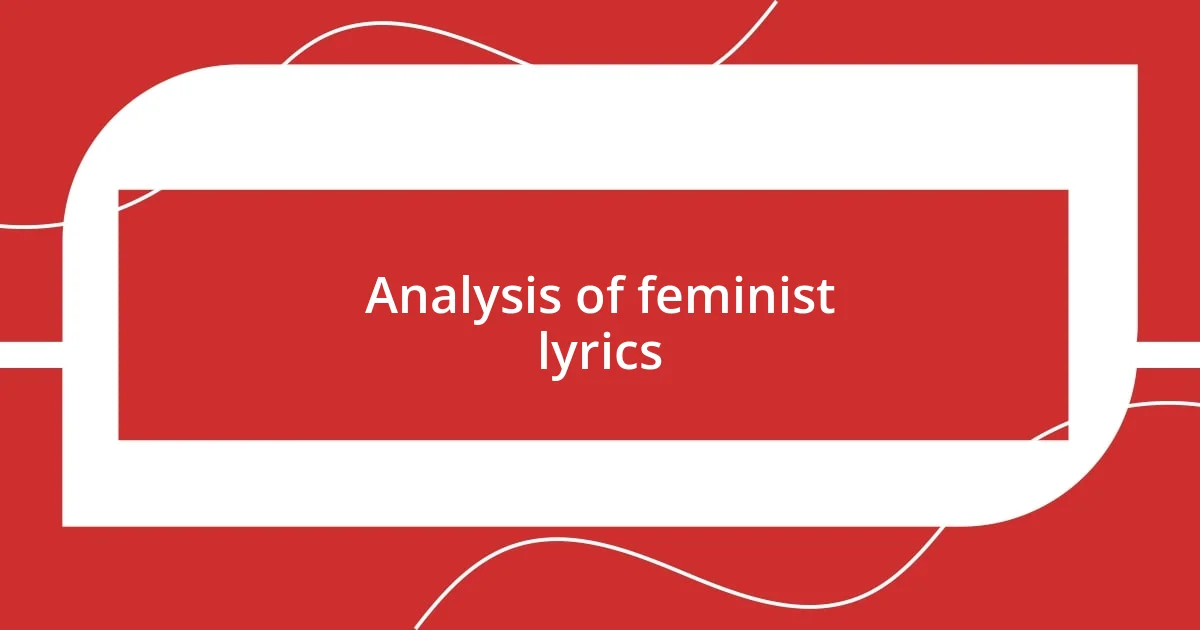
Analysis of feminist lyrics
When I analyze feminist lyrics, I often get swept away by the sheer power and vulnerability they can convey. For instance, listening to Joni Mitchell’s “Both Sides, Now” often brings tears to my eyes. The way she juxtaposes the innocence of youth with the complexities of adulthood resonates deeply with my own life experiences—reminding me that growth isn’t merely a straight line, but a winding path filled with lessons. Don’t you feel that emotional connection when a song articulates your innermost thoughts?
Moreover, the boldness of artists like Ani DiFranco inspires me to reflect on how music functions as an outlet for raw emotions and social critique. Her lyrics challenge listeners to dismantle oppressive structures and embrace their individuality. I remember feeling a surge of energy listening to “32 Flavors” for the first time—I felt like I was part of a revolutionary moment. Can music truly change how we perceive ourselves and our world? I believe it can, as it breathes life into personal narratives that often go unheard.
Then there’s the way Björk’s experimental approach introduces a different layer to feminist expression. Her song “Human Behaviour” delves into the intricacies of human relationships, all while intertwining elements of nature and technology. I find that her unique sound encourages me to think outside the box—enabling me to embrace my own difference. Isn’t that what feminist music is all about? Challenging norms and celebrating the beauty in our complexities?
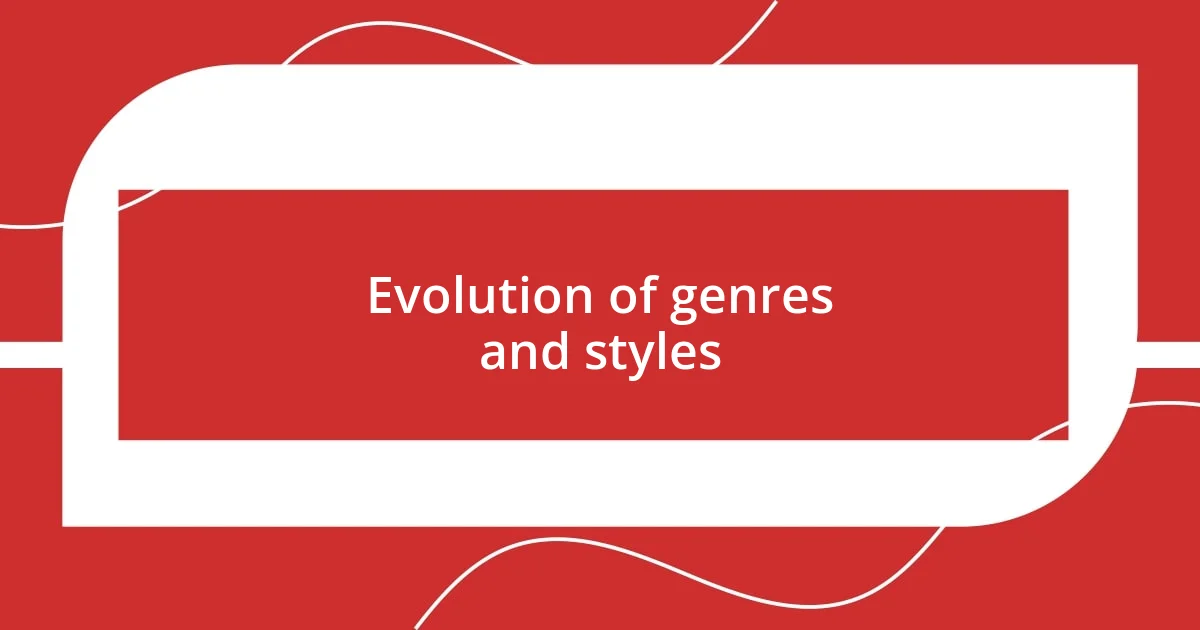
Evolution of genres and styles
As genres evolved, feminist influences transformed the very fabric of musical expression. For instance, the punk scene in the 1970s was a fierce rebellion, intertwining gritty guitar riffs with urgent messages about women’s liberation. I recall discovering bands like The Slits and feeling an adrenaline rush—that rawness and defiance spoke to my own frustrations with societal expectations. Doesn’t it feel liberating when music challenges the status quo?
With the emergence of hip-hop in the late 20th century, a new and compelling platform for feminist voices arose. Artists like Queen Latifah and Salt-N-Pepa tackled issues of sexism and empowerment head-on, blending catchy beats with powerful lyrics. I remember being captivated by the line, “I’m not a bitch or a hoe,” from Queen Latifah’s “U.N.I.T.Y.” It resonated with me deeply—how many times have we seen women pigeonholed in such derogatory ways? That track became an anthem for self-respect and assertion.
Transitioning into recent years, the explosion of genres such as indie-pop and R&B has brought a diversity of styles that reflect the multifaceted experiences of women today. Listening to artists like Solange, I find her blend of funk and soul refreshing and politically charged. Her album “A Seat at the Table” is not just a collection of songs; it’s a movement, encouraging listeners to embrace their identities unapologetically. Isn’t it astonishing how the evolution of music can echo our journeys, opening up space for conversations that matter?
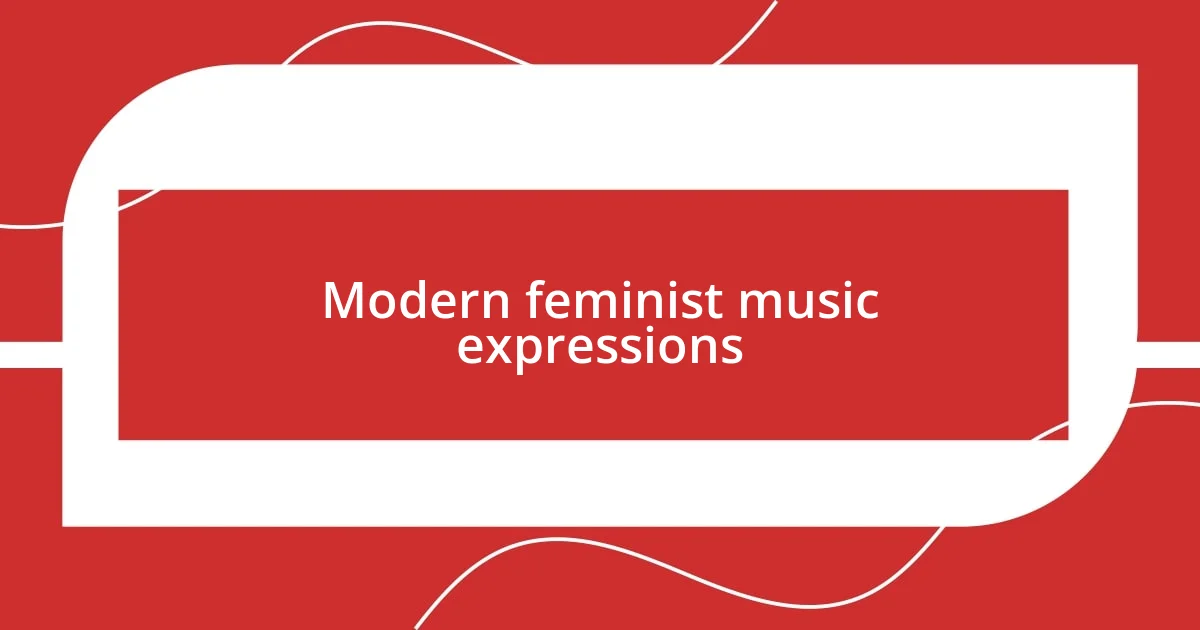
Modern feminist music expressions
Modern feminist music expressions capture the spirit of empowerment and defiance in ways that deeply resonate with listeners. I remember attending a concert where Lizzo performed “Truth Hurts.” The energy in the room was electric, and the lyrics felt like an affirmation of self-love and independence. Isn’t it amazing how music can unite us in moments of shared triumph? Lizzo’s unapologetic celebration of body positivity and individuality has inspired countless fans to embrace their own narratives.
More recently, the rise of artists like Billie Eilish has shifted the feminist dialogue in intriguing ways. Her hauntingly beautiful songs, such as “When the Party’s Over,” touch on vulnerability and emotional depth. I often find myself reflecting on my own fears and insecurities while listening to her music. It challenges the perception that feminist expression must always be loud and assertive. Can we find strength in silence and introspection? I believe we can, as Eilish demonstrates the power of embracing emotional complexity.
Then there’s the collaborative spirit of projects like the “#MeToo” movement’s influence on music. It’s heartening to see artists come together to address shared experiences of harassment and inequality. I recall feeling a sense of solidarity when watching the Grammy Awards, where survivors shared their stories through music. It made me ponder: how can we continue to amplify these voices and foster change? The answer lies in supporting one another and using our platforms to spark conversation, bridging the personal with the collective.
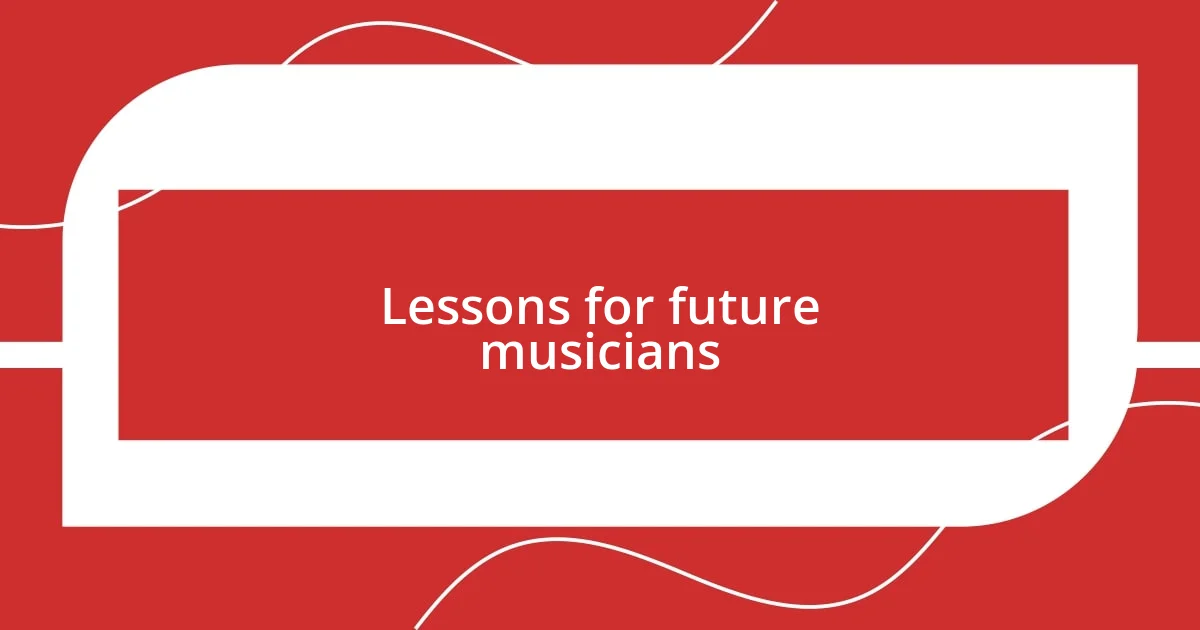
Lessons for future musicians
As future musicians look to carve their paths in this vibrant landscape, one powerful lesson from feminist music history is the importance of authenticity. I remember a time when I almost compromised my sound to fit into what was trendy. But reflecting on artists like Alanis Morissette, who poured personal experiences into her lyrics, reinforced the idea that sharing our true selves resonates far deeper with audiences. Isn’t it liberating to create music that reflects who you really are?
Another takeaway is the value of collaboration. Throughout history, many feminist musicians have shared their platforms, amplifying each other’s voices. I find immense inspiration in the way artists like Brandi Carlile and Hozier come together for powerful causes. It makes me wonder: when we unite our talents, what new heights can we reach? Embracing collaboration can foster community and push our creative boundaries, transforming not just our music but also our impact.
Lastly, future musicians should embrace the power of storytelling. Look at how Tracy Chapman’s poignant narratives tackle social issues, making her music timeless and universally relevant. Personally, when I write songs that draw from my personal journeys, I discover a connection with listeners that I never expected. Have you ever experienced that magic—where your story becomes part of someone else’s? It’s a profound reminder of our ability to inspire and create change through the art we share.


